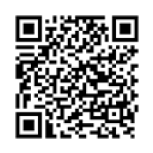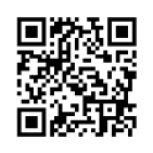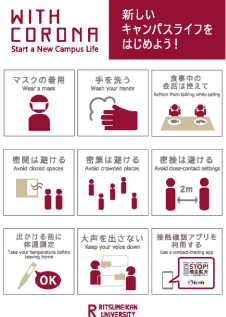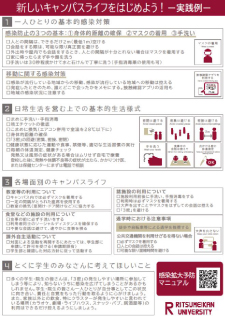Let’s Start
a New Campus Life!
Manual for Preventing the Spread of COVID-19 (Ver. 4)
June 15, 2020 (1st edition)
September 16, 2020 (2nd edition)
April 13, 2022 (3rd edition)
June 1, 2022 (Ver. 4)
Ritsumeikan University
Contents
- Introduction
- 1.Basic Measures
- 1Preventing droplet infection – wearing a mask is very important
- 2Preventing contact infection – making sure to wash your hands
- 3Taking temperature - take your temperature before going to campus
- 4Recording your action history (who you met, when, where and what you did) – using the Activity Record Sheet
- 5Knowing the possibility of infection as soon as possible -Let’s use COVID-19 Contact-Confirming Application (COCOA)!
- 6If you are informed that you are infected or suspected to be infected…!
- 7What should I do when…? – medical consultation
- 2.To Enjoy Our Campus Life
– Let’s start a new lifestyle together - 1Measures taken by the University to prevent infection
- 2Let’s follow these precautions! – for a safe life on campus
- 3Let’s think about our situation! – Awareness required of Ritsumeikan University students
- Attachments
- 1Health Check Sheet
- 2Activity Record Sheet
- 3Awareness raising poster “Let’s start a new campus life!”
- 4Awareness-raising flyers “Let’s start a new campus life! – examples of good practice”
- Collated Links and Information related to the Novel Coronavirus
(COVID-19)
Introduction
Ritsumeikan University continues striving to advance its education, research and student activities, while taking thorough measures to prevent the spread of infection and reconciling itself to coexisting with the novel coronavirus, to ensure that its students can lead a fulfilling campus life.
Our Ver. 4 of Manual for Preventing the Spread of COVID-19, titled “Let’s Start a New Campus Life!” has been created to raise awareness and inform students (undergraduate and graduate) about infection prevention measures necessary to ensure a safe and fulfilling campus life. We have revised this manual in accordance with the changes to the basic prevention measures based on the new level classifications set by the national government and the revised Ritsumeikan University Action Guidelines (BCP (revised December 15, 2021).
In addition, because the government has switched to concentrating on identifying close contacts within the same household at high risk of infection and hospitalized patients and residents at high risk of serious illness, it is no longer possible to identify other close contacts, so the university must now use its own judgment in identifying close contacts (“Concerning the Identification of Close Contacts Where Infections Have Occurred, Restrictions on Behavior, and Implementation of Active Epidemiological Surveillance based on the Characteristics of the Omicron Strain while it Remains the Dominant Strain” (2022.3.16 Ministry of Health, Labour and Welfare notification). To this end, the Medical Service Center has taken the lead in consolidating infection reports in order to promptly and smoothly identify quasi-close contacts at Ritsumeikan University and prevent the spread of infection ("Ritsumeikan University's Response Concerning the Identification of Close Contacts, Restrictions on Behavior, and Implementation of Active Epidemiological Surveillance based on the Characteristics of the Omicron Strain while it Remains the Dominant Strain” (2022.3.13 Executive Board of Trustees)), and based on this, it has revised this manual.
We urge that you read this Manual thoroughly and each of you take measures that you can. Let us all start a new campus life by implementing measures to prevent infection to make your student life more enjoyable and fulfilling. Thank you for your understanding and cooperation.
1.Basic Measures
Each of us is required to practice a “New Campus Lifestyle” in which it is vital that everyone strictly adhere to basic rules for preventing the spread of COVID-19 (i.e., properly wearing a mask, striving for Zero C, physical distancing, washing and disinfecting your hands, and gargling).
It is essential that everyone behaves responsibly “to avoid getting infected” and “not to transmit infection to others” as a means to protect themselves, someone they love, and the society.
1Preventing droplet infection – wearing a mask is very important
- Ritsumeikan University requires everyone who enters the campus to wear a mask while commuting to campus and while staying on campus (except when eating, drinking or exercising).
* You need to bring your own mask as a basic rule, but if your mask has been damaged, polluted or lost after entering the campus, you will be able to get a new one at Administrative Offices and Manabi Stations.
Points to note about wearing masks
- Please wear your mask properly. You are urged to wear nonwoven masks as they are more effective at preventing the spread and inhalation of droplets. If you wear your mask with your nose sticking out, you can end up inhaling droplets, so make sure you properly wear your mask covering both your nose and mouth and leaving no gaps.
- Individuals who have difficulty wearing a mask due to hypersensitivity or other reasons shall consult the Office of Student Affairs. Depending on the situation, such individuals may be asked to carry a card noting the difficulty of wearing a mask, or to use a face shield or a fan-shaped mask, instead. Students are asked to show understanding about the fact that wearing a mask can be difficult for some people.
- Ritsumeikan University has established the “Rules for Mask Wearing” which require all students, faculty, staff and visitors to wear a mask while on campus. Based on this provision, when a person is having a conversation or a chat without wearing a mask on campus, faculty or campus staff members may remind that person to wear a mask, as necessary.
2Preventing contact infection – making sure to wash your hands
- Alcohol disinfectants are placed at building entrances and locations where people gather. Be sure to wash your hands properly and disinfect your hands and fingers frequently.
* Make sure to bring a clean towel or handkerchief.
3Taking temperature - take your temperature before leaving home
- Take your temperature to see if you have a fever (*) before leaving home to attend school, and check whether you are experiencing symptoms including shortness of breath (difficulty breathing), a strong feeling of weariness (fatigue), headache, sore throat, runny nose, nasal congestion, or altered sense of smell or taste.
If you have any of the symptoms listed above, please do not come to campus and refrain from going out.* Rough guide for having a fever is over 37.5℃ or 1℃ higher than your normal temperature.
* Please make use of the “Health Check Sheet” attached at the end of this document (provided by Ritsumeikan Medical Service Center).
・Health Monitoring Sheet: Can be downloaded from the link below.
https://www.ritsumei.ac.jp/mng/gl/hoken/doc/selfhealthchecksheet.pdf
- If you have any of the symptoms described above, refrain from coming to school or otherwise going out.
* If you are going to be absent from a face-to-face class held on campus, please contact the faculty or the College Administrative Office/Manabi Station. If you are going to be absent from extracurricular activities, contact the person in charge of the club. - If you have forgotten to take your temperature before leaving home, there are thermometers available at the cafeteria and Manabi Stations, so please use them for self-health checks.
- In case that your fever is over 37.5℃ after coming to campus,
① Please go home as soon as possible and stay at home. Take your temperature
② If you are worried about your sickness or hope to consult a doctor and get medicines, please call medical clinic nearby or Ritsumeikan University Medical Service Center. Check “1(7) What should I do when…?- medical consultation” in this manual for details.
4Recording your action history (who you met, when, where and what you did) – using the Activity Record Sheet
- In the event that you got infected yourself, were identified as a “close contact” of an infected person, or someone close to you got infected, it is important to have kept a detailed record of your action history including who you met, when, where and what you did. Utilize the Action History Table attached to this document to keep an action history.
- The Action History Table is for your own self-check purposes. You will not be asked to submit it, so please keep as detailed a record as possible. In the event that you got infected or became a “close contact,” the public health center or University staff may conduct an interview, for which you can use the Action History Table.
・Activity Log
https://www.ritsumei.ac.jp/file.jsp?id=469814&if=.xlsx
5(5) Knowing the possibility of infection as soon as possible
-Let’s use COVID-19 Contact-Confirming Application (COCOA)!
- You are requested to install COVID-19 Contact-Confirming Application (COCOA) released by the Ministry of Health, Labour and Welfare (MHLW) to receive alert as soon as possible when you have potentially been infected.
- This application sends a notice to users when the user has potentially been in contact with a person who is COVID-19 positive to alert users of the possibility of infection as soon as possible. Information that will lead to the identification of an individual or information on the relation between the infected person and the contact (the person who receives notice of potential contact) will not be recorded in the application to ensure the protection of privacy.
- If a person who has been confirmed as COVID-19 positive is registered on the application as a positive person (upon his/her consent), individuals who have potentially been roughly within 1 meter from the positive person for a period over 15 minutes in the past 14 days will be notified of the possibility of infection. When persons who received the notice selects his/her health conditions from a list of symptoms, contact information of Returnees & Contact Persons Consultation Centers and advice on receiving a screening will be displayed.
- If you receive this notification, please refrain from coming to campus and receive a screening or respond otherwise as advised by the application.
- If you are confirmed as COVID-19 positive or as a “close contact,” please contact the University according to “(6) If you are informed that you are infected or suspected to be infected…!”.
About COCOA (contact tracing app)
https://www.mhlw.go.jp/stf/seisakunitsuite/bunya/cocoa_00138.html
- Please search in App Store or Google Play by entering “contact-confirming application” and install.
We also recommend you to utilize applications of contact tracing systems provided by municipalities.
Shiga Prefecture: Official LINE account “Shiga Prefecture – personal support on countermeasures against COVID-19”
https://www.pref.shiga.lg.jp/ippan/kurashi/ict/310749.html
Kyoto Prefecture: Kokotoro – Kyoto Prefecture COVID-19 Emergency Contact Service
https://www.pref.kyoto.jp/kikikanri/coronakinkyurenraku.html
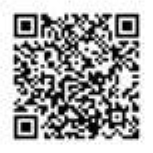
Osaka Prefecture: Osaka COVID-19 Tracing System
http://www.pref.osaka.lg.jp/smart_somu/osaka_covid19/index.html
6If you are informed that you are infected or suspected to be infected…!
- Please notify the university immediately if a medical institution has told you that you have been infected with COVID-19, or if someone you live with (family member, roommate, etc.) has been infected, and you have been instructed by said medical institution or a public health center to isolate.
- Reporting method
・Ritsumeikan Medical Service Center
https://www.ritsumei.ac.jp/health/
Search from the top page menu
・If you have been diagnosed as having COVID-19 or have been identified as a close contact
https://www.ritsumei.ac.jp/health/coronavirus_infection/
(1) Use Microsoft Forms to file an infection or close contact report.
- Make sure you have the following information on hand when filing your report.
If you have been diagnosed as having COVID-19
❶ Full name, name of college or graduate school, student ID number, date of birth
❷ Status of participation in extracurricular activities
❸ Type of test, date of onset (when symptoms began), and symptoms
(or the date of test for asymptomatic persons)
❹ Activity history before and after the date of onset
❺ All contacts starting two days before the day of onset (or the date of the test for asymptomatic persons) until the last day you were on campus
❻ COVID-19 vaccination history
❼ Contact information, telephone number
❽ Required information if you are a boarding student and wish to receive food aid
If you have been identified as a close contact of a COVID-19 patient
❶ Full name, name of college or graduate school, student ID number, date of birth
❷ Activity history including contact with the infected person, date of contact with close contacts, date of last contact
❸ Relationship with the infected person
❹ Your current physical condition
❺ Contact information, telephone number
❻ Required information if you are a boarding student and wish to receive food aid
* The Ritsumeikan Medical Service Center will contact you by phone (weekdays only) if there are any questions regarding the information you have entered.
- If you belong to a student organization, promptly notify the supervisor in the Student Office yourself or have the head of the organization do so on your behalf using the Microsoft Forms sheet. (For athletic clubs, please notify the Center for Athletics & Sport Services.) If you live in an international dormitory, promptly notify the supervisor in the Center for International Education using the Microsoft Forms sheet.
(2) If you require special considerations for classes
- Submit an application via the Learning Support Portal Site.
https://www.ritsumei.ac.jp/pathways-future/course/absence.html/
→ Please read the document entitled “Special Considerations for Classes due to COVID-19.” - If you are confirmed to be infected or identified as a “close contact” of an infected person, your attendance will be suspended for a given period. Suspension of attendance is not the same as an “official absence,” but the university will suspend your attendance based on Article 19 of the School Health and Safety Act. (*2)
a) Number of days infected persons should not attend classes
If you have symptoms: Counting the date of onset as Day 0, 10 days thereafter and 72 hours after symptoms disappear
If you are asymptomatic: Counting the test date as Day 0, 7 days thereafterb) Number of days close contacts (*1) should not attend classes
If you are identified as a close contact, even if your PCR test results are negative, you will be required to stop attending class (i.e., stay at home and observe your health) for seven days from the day after Day 0, where Day 0 is the last day you were in close contact with an infected person.*1: If the public health center does not identify you as a close contact, you may be identified as a semi-close contact in the following cases.
1) In the event of infection among students living communally in student dormitories, at retreat venues, etc.
2) In the event that a participant in an extracurricular activity (run by a university-recognized organization) becomes infected
3) In the event of eating, drinking, talking, and/or engaging in prolonged activity without wearing a mask with more than one person, including the student who tested positive
4) When there is close contact equivalent to contact within the same household, such as being in a relationship or sharing lodging with a student who has tested positive - The Medical Service Center that received the report will determine semi-close contacts.
Contacts will be notified about how many days they should not attend class (*2). Students who have been notified should file a report as if they were a close contact.
*2: If symptoms arise during the isolation period, please seek medical treatment and/or testing at a medical institution as soon as possible.
Public announcement in case a university constituent (student, faculty or staff member) becomes infected
- When it is confirmed that a constituent of Ritsumeikan University (student, faculty or staff member) has been infected
with COVID-19, we announce the minimum necessary facts based on the consent of the individual in question, from the
perspective of preventing the spread of infection, while paying due consideration of protection of personal information.
* Anyone can contract COVID-19 anywhere. Becoming infected is not the responsibility of the infected person. We do not tolerate any abuse or defamation against infected individuals. We ask everyone to have an understanding of and give consideration to respecting the human rights and protecting personal information of infected persons and their families.
* Ritsumeikan University has issued the Statement Against the Discrimination of Persons Infected with COVID-19 (September 1, 2020) by the name of Yoshio Nakatani, Chancellor of the Ritsumeikan Trust and President of Ritsumeikan University.
7What should I do when…? – medical consultation
- Be sure to use the Health Monitoring Sheet to measure your temperature and observe whether you have developed any symptoms.
https://www.ritsumei.ac.jp/mng/gl/hoken/doc/selfhealthchecksheet.pdf
・If you have a fever, cough, fatigue, sore throat, headache, or other symptoms, please be sure to rest.
・ If you developed even the slightest of cold symptoms, please consult with a medical institution that treats and tests COVID-19 before getting tested.
Contact a medical institution for a consultation before getting a test. - Information on medical facilities offering treatment and testing in the three prefectures )Kyoto, Shiga, Osaka)
Kyoto: https://www.pref.kyoto.jp/kentai/corona/shinryo_kensa.html
Shiga: https://www.pref.shiga.lg.jp/ippan/kenkouiryouhukushi/iryo/314835.html
Osaka: https://www.pref.osaka.lg.jp/iryo/osakakansensho/sinryokensa.html - Ritsumeikan Medical Service Centers will also accept phone consultations (Weekdays 9:30 - 17:00).
Medical Service Center
(Kinugasa)075-465-8231 Medical Service Center
(BKC)077-561-2635 Medical Service Center
(OIC)072-665-2110 Ritsumeikan Medical Service Center homepage
https://www.ritsumei.ac.jp/health/
2.To Enjoy Our Campus Life
– Let’s start a new lifestyle together
1Measures taken by the university to prevent infection
Ritsumeikan University Action Guidelines in Response to the COVID-19 Outbreak (Business Continuity Plan: BCP)
- At Ritsumeikan University, we have formulated the “Ritsumeikan University Action Guidelines in Response to the COVID-19
Outbreak (Business Continuity Plan: BCP)” which sets six Activity Restriction Levels (Level 0 – 5), each level outlining
the level of restrictions imposed on classes, research and self-directed extracurricular activities based on the status
of infection in the area where the campus is located as well as requests for university closure issued by the national
and/or local governments. Depending on the Activity Restriction Level, classes may be held mostly using multimedia tools and extracurricular activities restricted to prevent the spread of infection. We ask for your understanding and cooperation.
* “Ritsumeikan University Action Guidelines in Response to the COVID-19 Outbreak (Business Continuity Plan: BCP)” (Revised: December 15, 2021)
The basics for preventing infection
- In addition to the basic measures to prevent infection (1. ensuring physical distance, 2. wearing a mask, and 3. washing your hands) recommended by MHLW in their “New Lifestyle” guidelines and efforts to maintain Zero C (i.e., avoiding any and all of the Three Cs (closed spaces, crowded places, and close contact settings)), we will be taking every measure possible to ensure the safety and peace of mind of our students, faculty, and staff in the classroom and their lives on campus.
Requests to all students, faculty, staff and visitors
- Take thorough actions to ensure you do not get infected and do not infect others.
- Wear a mask.
- Properly wash your hands and disinfect your hands and fingers (Alcohol disinfectants are placed at locations where people gather).
- Take your temperature before leaving home and refrain from going out if you do not feel well.
- A thermal camera will be installed at cafeterias and student contact windows where many people gather.
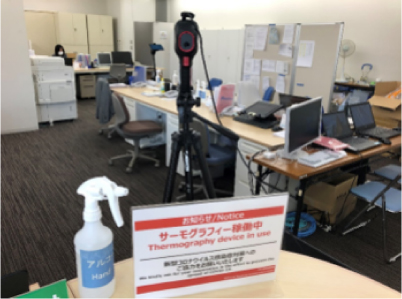
Measures to prevent infection during face-to-face classes
- Faculty should wear a mask (may use mouth shields or face shields as necessary).
- College and graduate students may also be requested to wear face shields depending on the contents of the class.
- Maintain physical distance as much as you can between yourself and others in the classroom.
- A transparent sheet will be installed in front of the faculty’s desk in all classrooms (measures to prevent the spread of droplets and ensure social distance during question-and-answer sessions).
- Items of communal equipment (e.g., handrails, door knobs, power switches) will be regularly disinfected.
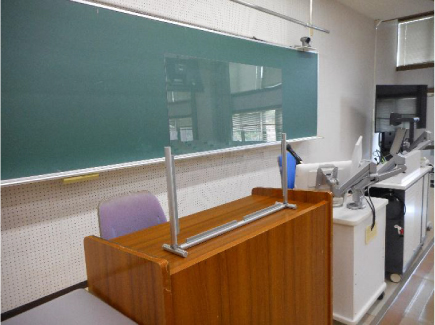
Ventilation
- (1) Mechanical ventilation and (2) natural ventilation by opening windows (for several minutes once every 30 minutes in classrooms) will be carried out as recommended by MHLW.
- Classroom windows and entrance doors may be left open during class for ventilation purposes. College and graduate students may be asked to lend a hand with opening and closing of the windows. Circulators may be used depending on the structure of the classroom.
Measures to be implemented at cafeterias
- Awareness raising to ensure proper hand-washing and disinfection of hands and fingers before using the cafeterias
- Temperature check before using cafeterias (A thermal camera will be installed at the entrance of cafeterias.)
- All seats will be partitioned with a panel to prevent droplet infection so that diners can eat with peace of mind.
- The cafeteria staff will check their health condition every day and wear a mask when serving customers.
- Thorough ventilation and social distancing will be ensured. Use of communal equipment such as water dispensers and tea dispensers will be suspended to prevent infection.
- Tables and chairs are to be sanitized twice daily.
- There will be times when entry will be limited due to crowded conditions. We ask for your understanding and cooperation.
Measures to be implemented during extracurricular and self-directed activities
- At Activity Restriction Level 2 as specified in the “Ritsumeikan University Action Guidelines in Response to the COVID-19 Outbreak (BCP),” only those clubs deemed as able to thoroughly enact infection prevention measures will be allowed to undertake normal extracurricular and self-directed activities in accordance with the guidelines issued by relevant associations. Resumption of limited activities will be permitted on a case-by-case basis, based on the submitted activity plan and by conducting interviews. Face-to-face activities including regional exchange events, competitions and camps held in a physical format will only be permitted to organizations that have obtained permission for resuming limited activities, based on prior application.
- We understand that many of you students have been feeling anxiety and stress under this situation where you cannot engage in the activities in the way you used to before the outbreak of COVID-19. We can help bring an end to this situation if each one of us acts with awareness and responsibility. Please think over your behavior and adopt good and prudent practices to prevent the spread of infection, thoroughly avoiding the Three Cs (closed spaces, crowded places, and close contact settings) to prevent cluster infection. The Division of Student Affairs will work, together with students, to improve the environment and facilitate student activities.
Points that the Division of Student Affairs will confirm with student organizations seeking to resume limited activities
①The organization is capable of continuously monitoring and reporting the health conditions of its members over a certain period (14 days or more). It can promptly detect any signs of deterioration of health conditions of its members and prevent unwell members from participating in the activities.
②All participating members can strictly adhere to specific infection prevention rules for eating, going out and socializing, not only during the activity but in everyday life as well. (The rules will be separately presented.)
③Members are aware of the risks involved in resuming activities when the COVID-19 pandemic has not yet been brought under control, and on the other hand, understand the purpose of why the University will permit the resumption of such activities. Members can explain why they will need to limit their activities in terms of the number of participants, venue, time, and format.
④Members can collaborate effectively with the faculty member (if an advisor, director or deputy director has been appointed) or activity instructor, and the chain of commands is clear within the organization (quick response system is organized so that the activity suddenly can be called off in cases of emergency).
⑤If the organization needs to use external facilities, it must adhere to the policies of the facility operator.
⑥The organization is required to draw up and submit a plan for preventing infection based on the characteristics of the activity, to ensure that it can continue to comply with the above points.
2Let’s follow these precautions! – for a safe life on campus
Precautions when commuting…
- Walk or cycle to campus if possible.
- If you are going to use public transportation, i) be sure to wear a mask, ii) refrain from talking to people, and iii) avoid traveling at peak times as much as possible.
Precautions while on campus…
- Be sure to wear a mask.
Ritsumeikan University requires everyone to wear a mask while on campus.
When a person is having a conversation without wearing a mask on campus, faculty or campus staff members may remind that person to wear a mask.
We ask for your understanding and cooperation. If your mask has been polluted, damaged or lost after entering the campus, you will be able to get a new one at the College Administrative Offices or Manabi Stations. - Wash your hands properly and disinfect your hands and fingers frequently.
- Strive for Zero C: Avoid any and all of the “Three Cs.”
In face-to-face classes…
- Be sure to wear a mask.
(Students may be requested to wear a face shield instead.) - Students should be seated at a certain distance from each other.
(If you receive instructions about where to sit or if your seat has been specified, please follow those instructions.) - Please cooperate when ventilating classrooms (opening windows and/or doors).
At the cafeteria…
- Be sure to wash your hands properly and disinfect your hands and fingers before and after using the cafeterias.
Alcohol disinfectants to disinfect hands and fingers will be placed at the entrance of cafeterias. - Check your temperature before using cafeterias.
A thermal camera will be installed at the entrance of cafeterias. If you have a fever (37.5℃ or higher), consult your primary care doctor, nearby hospital or the Medical Service Center via phone in accordance with the instruction on the bulletin board. - Ensure social distance between users.
- Wear a mask unless you are eating or drinking.
- Leave immediately after you finish your meal.
- Please refrain from talking while you are eating.
Use of University facilities…
- Properly wash your hands and disinfect your hands and fingers before and after using university facilities.
- Be sure to wear a mask when using university facilities.
- Refrain from talking loud or conversing without wearing a mask.
<At the restroom>
- Make sure to wash your hands properly with running water and hand soap after using the toilet.
Take about 30 seconds for effective cleaning. - Flush a toilet after shutting the seat cover.
If there is a seat cover at a Western style toilet, please shut the cover when flushing a toilet to prevent droplets from scattering. - Make sure to bring your own towel or handkerchief.
<At seminar houses, field houses, and international dormitories>
- Do best to ensure social distance, hand washing and avoidance of the “Three Cs.”
The risk of infection is particularly high when living spaces are shared. Care should be exercised to ensure social distance, proper hand washing and disinfection of hands and fingers, and avoidance of the “Three Cs.” - Refrain from eating and drinking while socializing.
The risk of infection is said to be high when you eat and drink while socializing or engaging in recreation. Please refrain from such activities. - Temporary users are asked to take their temperature upon check-in. We may decline your use if you have a fever. We ask for your cooperation and understanding in advance.
- As for use conditions or limitations to the use of lounges, common rooms and kitchen, please adhere to the instructions of the facility manager.
- The number of people who can stay in multiple bedded rooms may be limited.
<At athletic facilities, gyms (including the changing rooms), studios and halls>
- Use will only be permitted to students and organizations who have prior permission. We ask for your cooperation and understanding in advance.
- Ensure social distance.
Regardless of the type of physical activity or sport, maintain distances (roughly 2 meters) from those nearby, even when not engaged in said activity or sport. - The number of users may be limited as needed to avoid crowding (particularly in changing rooms and rest areas).
- When admitting spectators, ensure there is sufficient space between individuals, so they are not crowded together. Furthermore, make it known that people should not cheer in loud voices, refrain from conversation, and wear masks when talking.
- When holding any type of sports competition, refer to the guidelines established by central sports associations and take the actions required.
- Bring your own drink bottle.
Water dispensers will be replaced with water stands. Bring your own bottle and do not share drinks with other people. - Limit the number of training machines/equipment you use and disinfect each machine/equipment with alcohol after use.
Actions to avoid clusters (group infection): Striving for Zero C
- Avoid any and all of the “Three Cs” (closed spaces, crowded places, and close contact settings).
Group infections tend to occur where some or all of following conditions are present: closed spaces with poor ventilation; crowded spaces; and close contact settings where unspecified persons can come in contact with each other. Strive to maintain Zero C by avoiding - Each one of you is requested to avoid venues conducive to the “Three Cs” as much as possible. When it is unavoidable, protect yourself and others by wearing a mask, ventilating, avoiding loud talking, and avoiding conversations at close distance within an arm’s reach.
- Refrain from having a meal with persons other than your family as much as possible.
Avoid eating and drinking with friends or conversing without wearing a mask, regardless of on or off the campus. Avoid eating and drinking with persons other than your family, particularly at places said to be prone to cluster infection (e.g. karaoke rooms, theaters, clubs with live music, pubs, and bars), as much as possible.
3Let’s think about our situation! – Awareness required of Ritsumeikan University students
- We believe many of you undergraduate and graduate students are doing what you can do in your daily life to prevent the spread of COVID-19. However, your friends may ask you to go out with them, or you may join an event without realizing that the event is conducive to the “Three Cs,” and as a result, unknowingly transmit the virus to others. We urge each of you to face the situation sincerely and act with awareness and responsibility as a member of society.

